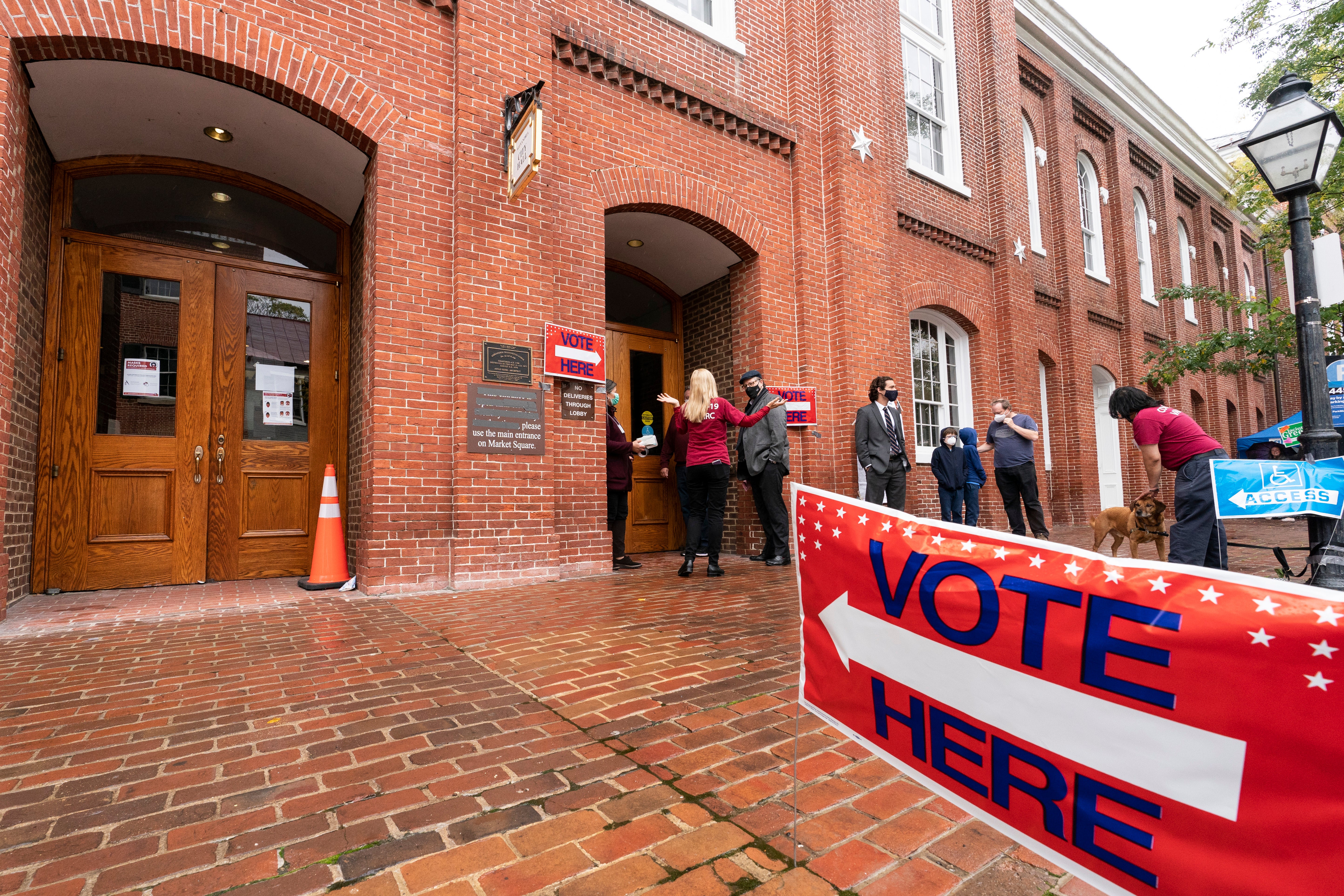AP VoteCast: Economy, COVID, schools top issues in Virginia
The economy ranked as the top issue facing the state of Virginia as voters cast their ballots in the tight race for governor, with the coronavirus pandemic and education trailing

The economy ranked as the top issue facing the state of Virginia as voters cast their ballots in the tight race for governor, with the coronavirus pandemic and education trailing.
In the race between Democrat Terry McAuliffe and Republican Glenn Youngkin, 34% of Virginia voters say the economy and jobs was the most important issue facing the state. Seventeen percent name COVID-19 and 14% choose education, according to AP VoteCast, a survey of voters.
Health care (7%), climate change (7%), racism (5%), immigration (5%), abortion (5%) and law enforcement (4%) were all lower-tier issues.
Tuesday's election is the most closely watched and competitive contest since President Joe Biden defeated Donald Trump last year, and is widely seen as a gauge of how voters are feeling ahead of next year's midterm elections.
Here’s a snapshot of who voted and what matters to them, based on preliminary results from AP VoteCast, a survey of more than 2,500 voters in Virginia conducted for The Associated Press by NORC at the University of Chicago
IS VIRGINIA'S ECONOMY SOARING OR SINKING?
Youngkin, a former private equity executive, often asserted during the campaign that Virginia’s economy was “in the ditch," but a majority of voters disagreed. Fifty-six percent said the state’s economy is in good shape, compared with 44% saying economic conditions are poor.
Youngkin argued Virginia's record budget surplus was the result of overtaxation as he campaigned on a promise to enact substantial tax cuts.
McAuliffe countered that the surplus was due to strong economic growth under Democratic leadership and argued that Youngkin’s opposition to abortion rights and conservative position on LGBTQ issues would hamper efforts to recruit new businesses to the commonwealth.
As the costs of goods rises, about two-thirds of Virginia voters in this year’s election say their family’s financial situation is holding steady. That’s a similar percentage compared with voters in last year’s presidential race.
Another 16% say they are getting ahead financially, while about as many — 18% — say they are falling behind.
SCHOOL DEBATE DECISIVE FOR MANY
Schools became a major focus of the governor's race for Youngkin, who localized a debate happening nationwide after McAuliffe said during a debate that parents shouldn't “be telling schools what they should teach.”
A quarter of Virginia voters say the debate over teaching critical race theory in schools was the single most important factor in their vote for governor, but a similar percentage identified the debate over handling COVID-19 in schools as most important.
More voters said the public school system in Virginia is focusing too much, not too little, on racism in the U.S., 43% vs. 32%. Another 24% said the focus on racism is about right.
Most voters say they think racism in the U.S. is a serious problem, but fewer than half (44%) call it “very serious.”
About 6 in 10 Virginia voters support both mask mandates for teachers and students in K-12 schools and vaccine mandates for teachers.
MORE INDECISION THAN 2020
About 6 in 10 voters say they’ve known all along whom they would be backing the governor’s race. In the presidential race last year, three-quarters of Virginia voters said they knew all along whom they would back, though about as many decided in the last few days.
About 3 in 10 voters now say they decided over the course of the campaign. Roughly 1 in 10 said they were still deciding in the last few days.
MCAULIFFE GETS MORE BLAME FOR ATTACKS
Most voters think the gubernatorial campaign featured unfair attacks from at least one candidate, but voters are somewhat more likely to say only McAuliffe attacked Youngkin unfairly than the other way around. Close to 2 in 10 voters say both attacked the other unfairly.
CONTINUED SKEPTICISM ABOUT THE VOTE COUNT
Although Virginia experienced no major issues with its vote count in 2020, only about half of voters in Virginia are “very confident” that the votes in the election for governor will be counted accurately. Another 3 in 10 voters are “somewhat confident.”
Still, confidence is stronger among voters now compared with voters in last year’s presidential election: Just 25% then said they were very confident votes would be counted accurately.
MAJORITY BACK ABORTION RIGHTS
A majority of Virginia’s voters — about 6 in 10 — say abortion should be legal in all or most cases, while 4 in 10 say it should be illegal in all or most cases.
Even so, a majority of voters fall into the middle, supporting abortion in some instances but not all — a third of voters say abortion should be legal in most cases and about that many say abortion should be illegal in most cases.
___
AP VoteCast is a survey of the American electorate conducted by NORC at the University of Chicago for Fox News and The Associated Press. The survey of 2,524 voters in Virginia was conducted for seven days, concluding as polls closed. Interviews were conducted in English or Spanish. The survey combines a random sample of registered voters drawn from the state voter file and self-identified registered voters selected from nonprobability online panels. The margin of sampling error for voters is estimated to be plus or minus 2.5 percentage points. Find more details about AP VoteCast’s methodology at https://www.ap.org/votecast.
Bookmark popover
Removed from bookmarks